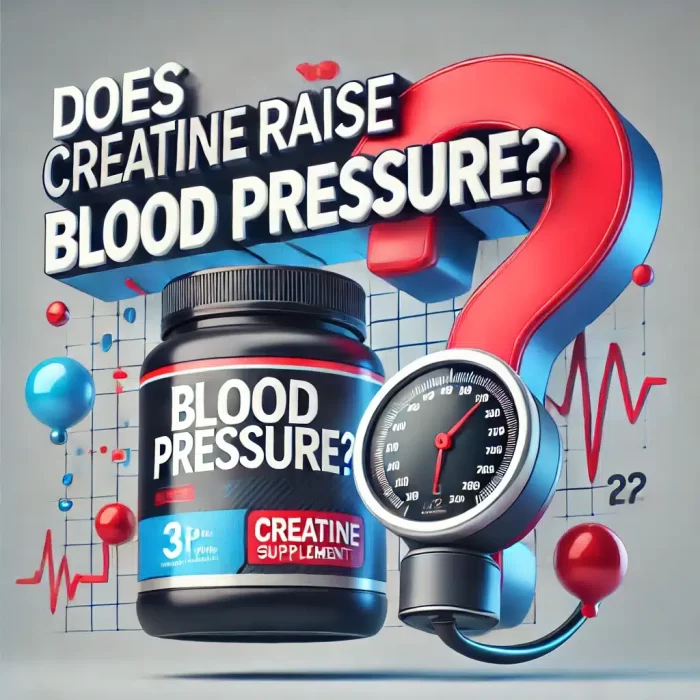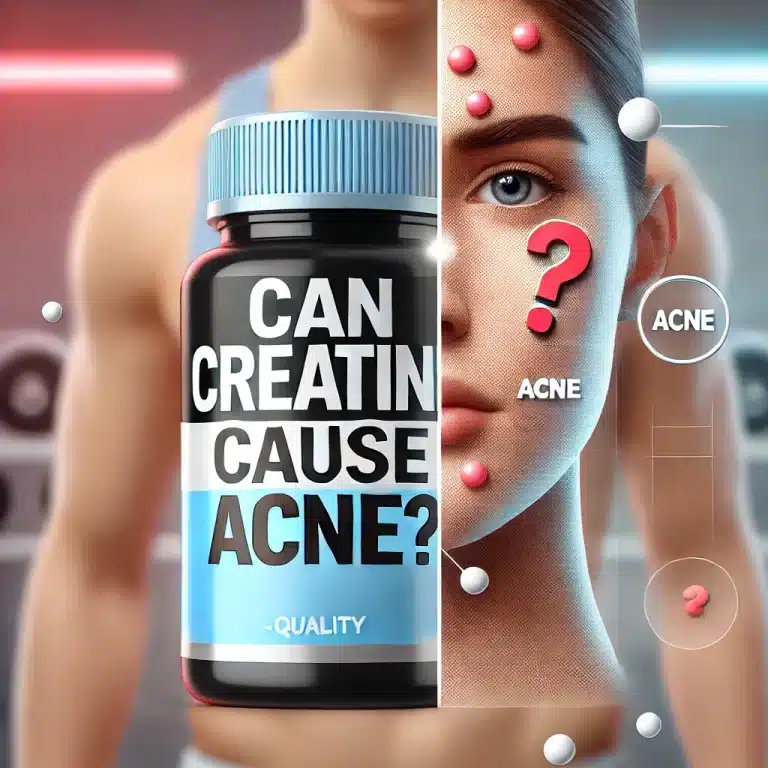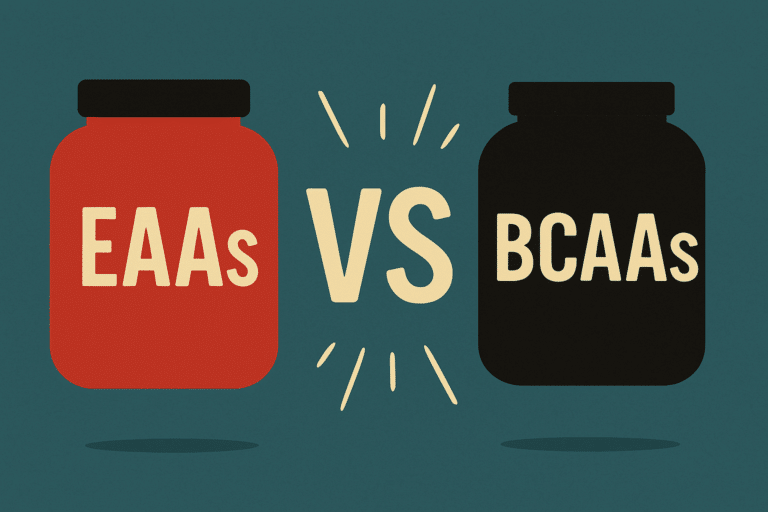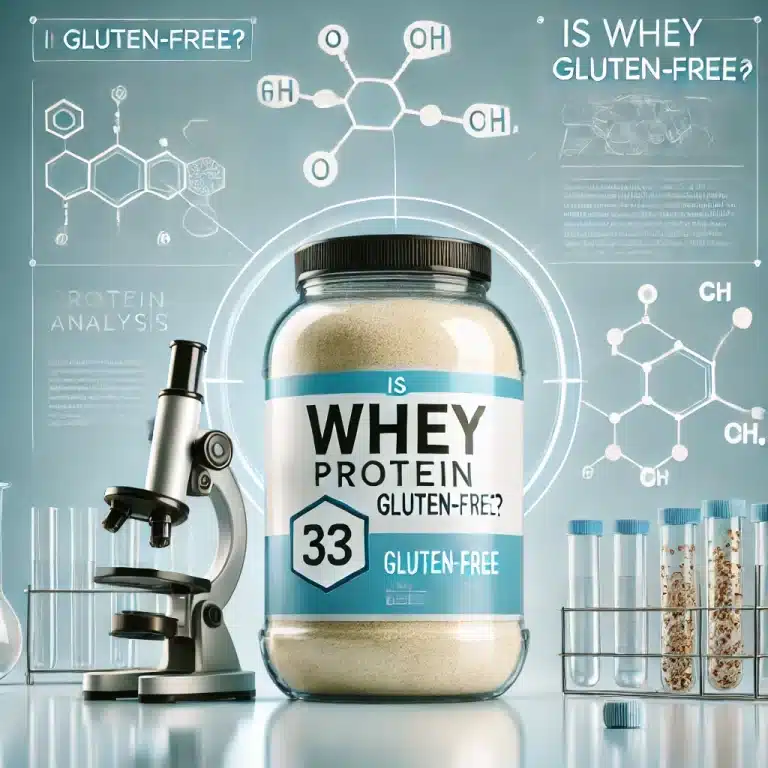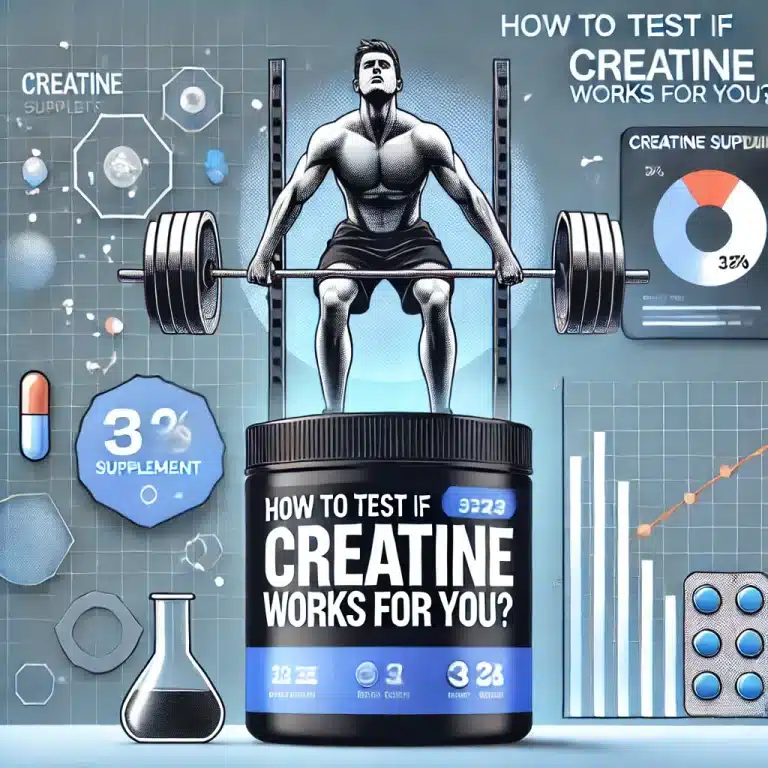Does Creatine Raise Blood Pressure?
If you’ve ever considered taking creatine, you’ve probably come across concerns about its impact on blood pressure. Some people worry that it may lead to hypertension, while others argue that it has no effect or even benefits heart health. With so much conflicting information, it’s easy to feel unsure about whether creatine is safe especially if you already monitor your cardiovascular health.
As a nutritionist, I’ve worked with athletes, fitness enthusiasts, and everyday individuals who want to optimize their performance while staying healthy. So, does creatine raise blood pressure, or is this concern overblown? Let’s break down the science and clear up the confusion.
What Is Creatine and How Does It Work?
Creatine is a naturally occurring compound found primarily in muscle cells. It plays a vital role in energy production, particularly for high-intensity and explosive movements like sprinting and weightlifting. The body synthesizes creatine in the liver, kidneys, and pancreas, but it’s also found in dietary sources like red meat, poultry, and fish.
When you take creatine supplements, your muscles store more phosphocreatine, which serves as a rapid source of energy. This leads to improved performance, quicker recovery, and enhanced muscle hydration.
Key Functions of Creatine in the Body
- ATP Regeneration – Creatine helps replenish adenosine triphosphate (ATP), the body’s primary energy source for quick, intense activities.
- Increases Muscle Hydration – Creatine pulls water into muscle cells, enhancing volume and fullness.
- Boosts Cognitive Function – Some studies suggest creatine may improve brain energy metabolism, benefiting memory and focus.
- Supports Recovery – It reduces muscle breakdown and improves recovery between workouts.
- May Have Cardiovascular Benefits – Emerging research suggests that creatine could improve circulation and endothelial function, which are crucial for heart health.
With all these benefits, some still wonder: Does creatine raise blood pressure? Let’s look at the science.
Does Creatine Increase Blood Pressure?
What Does the Research Say?
Scientific studies suggest that creatine does not significantly raise blood pressure in healthy individuals. Most research indicates neutral to beneficial effects on cardiovascular health.
- A 2001 study in the Journal of Strength and Conditioning Research found no significant changes in blood pressure among healthy participants supplementing with creatine.
- A 2017 study published in the Journal of the International Society of Sports Nutrition concluded that creatine supplementation does not negatively affect blood pressure or heart rate in athletes or sedentary individuals.
- A 2020 study in the Journal of Clinical Hypertension found that creatine did not raise blood pressure in older adults and might support cardiovascular health.
- Some evidence suggests that creatine may even support endothelial function, which helps regulate blood vessel dilation and may aid in blood pressure control.
Additionally, creatine has been studied for its role in muscle hydration and electrolyte balance, which can indirectly influence blood pressure regulation. By improving water retention in muscle cells, creatine may help maintain stable fluid levels, which can support overall circulatory function.
When Might Creatine Influence Blood Pressure?
While creatine is generally safe, there are some cases where it might contribute to temporary blood pressure changes:
- Dehydration Risk – Since creatine pulls water into muscles, not drinking enough water may lead to mild dehydration, which can temporarily elevate blood pressure. Dehydration causes blood vessels to constrict, making it harder for blood to flow efficiently.
- High Sodium Intake – Some pre-workout supplements containing creatine also have high sodium content, which can elevate blood pressure if consumed in excess. If you’re using pre-mixed creatine formulas, be mindful of added sodium and stimulants.
- Temporary Water Retention – In the early phase of creatine supplementation, some people experience slight water retention, which may lead to a small and temporary increase in blood pressure. However, this typically resolves as the body adapts to higher creatine levels.
- Pre-Existing Hypertension – If someone already has high blood pressure, they should monitor their response to creatine and ensure they’re maintaining good hydration and a balanced diet.
- Caffeine Interaction – Many pre-workout supplements containing creatine also have caffeine, which can cause temporary spikes in blood pressure. If you’re sensitive to caffeine, opt for plain creatine monohydrate rather than pre-workout blends.
How Common Is Blood Pressure Elevation with Creatine?
The likelihood of creatine causing sustained high blood pressure is extremely low. Most reported cases of slight blood pressure increases are due to dehydration, excess sodium, or interactions with stimulants like caffeine.
If you are concerned about blood pressure while using creatine, simply monitor your hydration, sodium intake, and stimulant use, and you should have no issues maintaining healthy blood pressure levels.
Can Creatine Help Blood Pressure?
Surprisingly, creatine may not just be neutral for blood pressure it might have beneficial effects on cardiovascular health. Emerging research suggests that creatine could support healthy blood pressure levels by improving vascular function and energy production in heart cells.
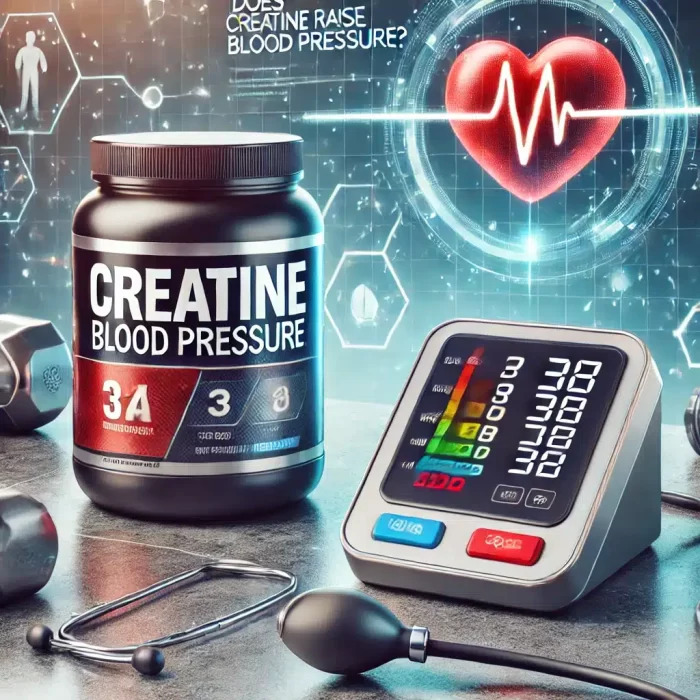
How Creatine May Support Blood Pressure Regulation
- Enhances Endothelial Function – The endothelium is the inner lining of blood vessels, responsible for regulating dilation and contraction. Studies suggest that creatine supplementation may enhance nitric oxide production, improving blood vessel flexibility and circulation.
- Supports ATP Production in Heart Cells – Just like it helps muscles, creatine also provides energy to heart cells, which may improve cardiovascular efficiency and help regulate blood flow.
- Reduces Oxidative Stress – Some research indicates that creatine may act as a natural antioxidant, helping to reduce inflammation and oxidative damage that contribute to high blood pressure.
- Improves Exercise Tolerance – Regular exercise is one of the best ways to lower blood pressure. By enhancing endurance and muscle performance, creatine allows individuals to exercise at higher intensities, promoting long-term cardiovascular health.
Scientific Evidence Supporting Creatine’s Cardiovascular Benefits
- A 2016 study in the European Journal of Applied Physiology found that creatine enhanced blood vessel dilation and circulation, leading to better oxygen delivery and nutrient transport.
- A 2020 study in the Journal of Clinical Hypertension suggested that creatine helped regulate blood pressure in aging populations by improving mitochondrial energy production in heart cells.
- Research on neurological disorders (such as Parkinson’s and ALS) has also shown creatine’s potential neuroprotective effects, which may be linked to its ability to improve overall circulation and reduce oxidative stress.
Who Might Benefit from Creatine for Cardiovascular Health?
While creatine is widely known for its muscle and performance-enhancing benefits, its potential role in cardiovascular health is gaining attention. Certain individuals may see added advantages when using creatine as part of a heart-healthy lifestyle.
1. Athletes and Active Individuals
For those who engage in high-intensity training, endurance sports, or weightlifting, creatine enhances energy production, reduces muscle fatigue, and improves recovery. This, in turn, supports cardiovascular health by:
- Increasing exercise efficiency allows for longer, more intense workouts that benefit heart health.
- Enhancing oxygen delivery to muscles reduces strain on the heart during exertion.
- Reducing post-exercise inflammation, promoting faster recovery and cardiovascular resilience.
2. Older Adults and Aging Populations
As we age, muscle mass naturally declines, and so does mitochondrial efficiency in heart cells. Creatine supplementation may help by:
- Supporting muscle retention, preventing frailty, and reducing fall risks.
- Improving mitochondrial function enhances heart cell energy metabolism.
- Potentially lowering the risk of sarcopenia, a condition linked to increased cardiovascular issues.
- Promoting better circulation can contribute to healthy blood pressure regulation.
3. People with Endothelial Dysfunction
Endothelial dysfunction a condition where blood vessels fail to dilate properly can be an early marker of cardiovascular disease. Creatine may aid in:
- Enhancing nitric oxide production helps improve blood vessel flexibility and circulation.
- Reducing oxidative stress, which plays a role in arterial stiffness and high blood pressure.
- Supporting healthy vascular function, promoting better cardiovascular outcomes over time.
4. Individuals with Neurological Conditions
While not directly related to blood pressure, creatine has shown promise in supporting neurological health, which can indirectly influence cardiovascular function. Studies suggest creatine may:
- Help in neurodegenerative diseases like Parkinson’s and ALS, where cardiovascular control can be affected.
- Improve cognitive function and energy metabolism in the brain, which may benefit those at risk for stroke or other vascular complications.
5. People Looking to Improve Recovery and Metabolic Health
Beyond performance, creatine has been shown to aid in glucose metabolism and recovery post-exercise. This may be beneficial for:
- Individuals with metabolic syndrome or insulin resistance, are conditions often linked to high blood pressure.
- Those who experience frequent muscle fatigue, as creatine, supports better energy production and muscle recovery.
- Individuals recovering from cardiovascular events, where maintaining muscle mass and strength is critical for rehabilitation.
How to Maximize Creatine’s Benefits for Blood Pressure
To make the most of creatine’s potential cardiovascular benefits and ensure it does not negatively impact blood pressure, follow these guidelines:
1. Choose High-Quality, Pure Creatine Monohydrate
- Opt for pure creatine monohydrate rather than blends containing excess sodium, artificial fillers, or stimulants that may raise blood pressure.
- Look for third-party tested products to ensure purity and safety.
2. Stay Hydrated to Prevent Blood Pressure Spikes
- Since creatine pulls water into muscle cells, it’s important to increase fluid intake to maintain hydration and support healthy circulation.
- Aim for at least 2.5–3 liters of water per day, or more if engaging in intense exercise.
3. Pair Creatine with a Heart-Healthy Diet
- Include foods that promote vascular health and nitric oxide production, such as:
- Leafy greens (spinach, kale, arugula) – High in nitrates that help relax blood vessels.
- Omega-3-rich foods (salmon, walnuts, flaxseeds) – Reduce inflammation and support heart health.
- Antioxidant-rich fruits (berries, citrus, pomegranate) – Help fight oxidative stress.
- Avoid excessive processed foods, high sodium intake, and trans fats, which can contribute to high blood pressure.
4. Monitor Sodium and Caffeine Intake
- Some pre-workouts containing creatine also include high levels of caffeine or sodium, which can spike blood pressure.
- If you are sensitive to stimulants or have hypertension, opt for creatine-only supplements without added stimulants.
5. Exercise Regularly for Synergistic Cardiovascular Benefits
- Resistance training helps maintain lean muscle mass and supports long-term metabolic health.
- Aerobic exercise (such as brisk walking, swimming, or cycling) lowers blood pressure and enhances circulation.
- Creatine may improve exercise endurance, allowing you to sustain longer, more effective workouts that benefit heart health.
6. Track Blood Pressure and Adjust Dosage if Needed
- If you have pre-existing hypertension, keep track of your blood pressure before and after supplementation.
- A standard 3–5g daily dose of creatine is sufficient for most people higher doses (20g loading phases) may increase water retention and should be monitored.
Should You Take Creatine If You Have High Blood Pressure?
As a nutritionist, I always advise people with high blood pressure to be cautious with any supplement. However, based on the research, I don’t see a reason why creatine should be automatically avoided. The key is to understand your body’s response and ensure you’re taking the right precautions.
How I Recommend Using Creatine If You Have High Blood Pressure
- Stay Hydrated – Since creatine can pull water into muscle cells, drinking plenty of fluids prevents dehydration, which could temporarily raise blood pressure.
- Monitor Sodium Intake – Some creatine supplements contain added sodium, especially pre-workout blends. Stick to pure creatine monohydrate and avoid excess sodium in your diet.
- Check Your Blood Pressure Regularly – If you already have hypertension, track your blood pressure while using creatine to see how your body responds. If you notice any changes, adjust accordingly.
- Use Moderate Doses – While some people use loading phases (20g per day for a week), I recommend starting with 3–5g per day, which is effective without excessive water retention.
- Avoid Caffeine & Stimulants – Many pre-workouts with creatine contain high doses of caffeine, which can spike blood pressure. If you have hypertension, opt for stimulant-free options.
- Exercise Regularly – Resistance training and cardiovascular exercise are key to maintaining healthy blood pressure. Creatine can help you train harder, supporting long-term heart health.
Who Should Avoid Creatine?
- If your doctor has advised against fluid retention due to heart or kidney issues, creatine may not be the best option.
- If you are taking medications that affect blood pressure, consult your physician before supplementing.
- If you experience unwanted side effects like bloating or increased blood pressure, consider lowering your dose or stopping use.
In my experience, most people with high blood pressure can safely take creatine as long as they stay hydrated, monitor sodium intake, and track their blood pressure. Scientific research backs up the fact that creatine does not cause sustained increases in blood pressure and may even provide some cardiovascular benefits.
That said, everyone’s body responds differently, so if you’re unsure, talk to your doctor and listen to your body. If used correctly, creatine can still be a valuable supplement for muscle performance and recovery without putting your heart at risk.
Frequently Asked Questions:
Can creatine cause water retention and affect blood pressure?
Creatine can cause mild water retention in muscles, but this does not typically lead to an increase in blood pressure. The water is stored in muscle cells rather than in the bloodstream, so it does not cause bloating or a significant rise in blood pressure.
Is creatine safe for people with high blood pressure?
Generally, creatine is considered safe for most people, including those with high blood pressure. However, if you have hypertension or cardiovascular concerns, it’s best to consult a doctor before taking creatine.
Does creatine affect kidney function and blood pressure?
There is no evidence that creatine harms kidney function in healthy individuals. However, those with pre-existing kidney issues should be cautious and consult their healthcare provider before using it.
Final Thoughts: Does Creatine Raise Blood Pressure?
Based on scientific evidence and real-world experience, creatine does not significantly raise blood pressure in healthy individuals. It may offer potential cardiovascular benefits, especially when used properly. However, those with pre-existing hypertension should be mindful of hydration, sodium intake, and overall cardiovascular health while supplementing with creatine.
For most people, creatine is a safe and effective supplement that supports muscle growth, performance, and recovery without causing unwanted cardiovascular side effects. If you’re concerned about blood pressure, simply monitor your body’s response and consult a healthcare professional if needed.
